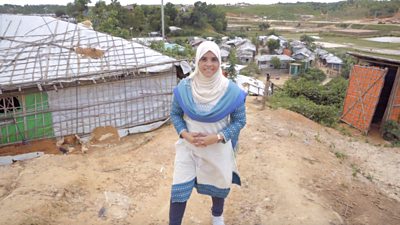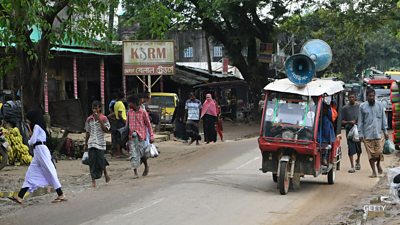More than 800,000 Rohingya people live in camps in Coxβs Bazar, Bangladesh β one of the most concentrated humanitarian emergencies in decades.
In a situation like this, access to information is as important as food, water and shelter β it saves lives. It is also critical that the voices of affected people β their needs, views and complaints β are heard, understood and acted on by agencies providing relief.
As Rohingya is predominantly a verbal language, ΒιΆΉΤΌΕΔ Media Action produces audio podcasts to be used as part of community discussion groups to ensure people have access to accurate and timely information. Our videos are also popular as the community can see their lives represented. They give people a voice and provide them with essential information, helping them and their families to stay safe and to protect their health. Read about our response to a devastating fire in March 2023.

Esmat Ara Issu is a junior producer and presenter for our work in Cox's Bazar
"We produce a wide range of communication materials for Rohingya girls and women providing them lifesaving, relevant and accurate information in their language which is disseminated through various listening groups. Many people do not have much idea how important these programmes are to these women and girls. It helps them to be aware about their rights, and inspires them to raise their voice and take decisions, be it about their health, marriage, study or participation in society.
"I love to produce and present our content because I truly believe the kind of materials we make really contributes in bringing change into the lives of Rohingya people. It gives me pride as well to get engaged and participate in a meaningful activity that really contributes to people's lives.
"I noticed people like to listen when someone can talk to them in easily accessible language. I enjoy listening and talking to people, and so I wanted to be a communicator and presenter. And last but not least I also like to work closely with people, and itβs really great that my work gives me the opportunity to be close to them. My inspiration comes from my work helping people, and being with them."
Highlighting local heroes
To celebrate those people who are using their skills to help themselves and others, we have also produced a video series called Aa'rar Bahadur (Our Heroes) that highlights how Rohingya people living in the camps are helping each other to solve problems.
New challenges in the pandemic
The COVID-19 pandemic created new challenges in providing the Rohingya people and host communities with accurate, actionable information. Rumours about this new virus spread fast, and we responded with audio and visual tools to ensure the community had the correct information in the right language about the virus, and what steps to take to reduce the risks.
- Soiyi Hota (Correct Information) is a short audio podcast focused on information about COVID-19 and other critical issues - designed for sharing over loudspeakers or sharing in WhatsApp groups and other online forums.
- Flash cards for use by community health workers explaining the importance of testing, and explaining new concepts such as isolation and quarantine;
- Short instructional videos for frontline health workers on how to improve their communication with the community, to help reinforce the communityβs trust in them;
- Factual and animation videos with easy-to-understand tips on staying safe during the COVID-19 pandemic.
I realised how important it was to share the right information with the community during this COVID-19 situation. ΒιΆΉΤΌΕΔ Media Action called me and shared some audio clips, which I played, and I shared some important information with our community people. They agreed to follow precautions against COVID-19."
Audio messaging is the most effective tool for community engagement and also for consistent messaging, which is most efficient for Rohingya community people."
Information for everyone
All programmes are broadcast in local dialects, so they may be understood by both Rohingya people and host communities. As the emergency evolves, weβre developing new ways to help keep people informed and give their views.
- Weβre training staff and installing audio-visual technology at several information hubs, enabling vital information to be made more accessible to people with low levels of literacy.
- These information hubs are then stocked with audio content, animations, flash cards and short videos.
- We are training volunteers to organise listening groups - bringing people together to hear highlights from the radio programmes β and to see our growing library of audio-visual content on topics ranging from hygiene and vaccinations to cyclone preparedness and community safety.
- Weβre supporting community leaders, including imams, to run discussion groups using our multi-media materials, to help get trusted information out. This includes female leaders who can most effectively reach Rohingya women with information about maternal and child health, gender-based violence and child marriage.
Finding out What Matters
Many agencies are working to communicate with, and gather feedback from, the people in Coxβs Bazar. Weβre working with Translators Without Borders to find out what Rohingya people and the host communities really need, and sharing that feedback with agencies to improve the quality and effectiveness of their response, in part through a regular bulletin called ββ During the COVID-19 pandemic, we are also tracking rumours and responding with accurate information.
This project builds on our experience in humanitarian communication in Bangladesh, where we lead the national Communication with Communities Working Group and have responded to smaller-scale emergencies in the country. We provide high-quality, expert advice for the UN, NGOs and government as the Rohingya emergency continues to develop.
Tackling violence against women and girls
Gender-based violence remains a serious issue in Coxβs Bazar. We believe our 20-episode audio drama series, Aa'rar Kissa (Our Story), is the first such drama produced in the Rohingya language. The drama follows three families as they grapple with day-to-day life, dealing with love, crime and injustice while tackling some of the deep-rooted drivers of gender-based violence and child marriage. The audio drama series aims to increase knowledge and raise awareness of support services available for women and girls in the camps.
We created a second series in 2021.
Looking forward
Our work in Coxβs Bazar continues, with plans for longer-form audio and video content about complex issues in both Rohingya and host communities, including developing life skills, finding ways to bridge social divides and supporting resilience. Weβre also working on factual video that includes both studio and on-location filming, and both short and long podcasts for use in discussion groups.
Project information
| Project name |
SHPR Strengthening Humanitarian Preparedness and Response in Bangladesh; Common service for community engagement and accountability for Rohingya refugee response. |
| Funders | ECHO, FCDO |
| Dates |
August 2018 to April 2021 |
| Themes | Humanitarian |
| Outputs |
|
|
Project name |
Diversity mass information and communication channels and content development initiative. |
| Funder | In partnership with Terre des Hommes and funded by UNHCR |
| Dates |
July 2019 to March 2021 |
| Themes | Humanitarian, protection and accountability. |
| Outputs |
|
|
Project name |
Delivering Health, Nutrition and Livelihood and Protection services for Rohingya Refugees and vulnerable host communities in Coxβs Bazar, Bangladesh. |
| Funder | Consortium with International Refugee Committee and Concern Worldwide |
| Dates |
September 2020 β July 2023 |
| Themes | Humanitarian, GBV and primary health services including SRMNCH, psychosocial support and non-communicable diseases. |
| Outputs |
|
-

Read our insights from Cox's Bazar
Our research and insight from the Common Service consortium working in Cox's Bazar